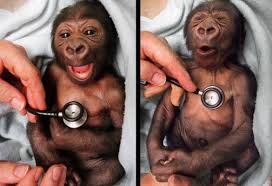I remember catching my first fish when I was six or seven, and getting upset when my father removed the hook with a pair of pliers and put my bass on a stringer. I was sure he was hurting the fish, but he assured me that fish don't feel pain. I don't know if he actually believed that or was only trying to comfort me, but, of course, it's not true. If animals--even fish--didn't feel pain, or experience fear, they would not survive long in the wild. And any one of us with a pet know that animals also have complex emotional lives. Some scientists still argue the finer points in spite of the growing evidence that we aren't all that special. According to
http://www.livescience.com we have plenty in common with other animals. For the next few posts, I'm going to look at a few examples.
 |
| This baby gorilla reacts to a cold stethoscope |
Facial expressions
I love this picture of a baby gorilla reacting to a cold stethoscope. I don't think there is any other way to interpret it, but, according to an article on Livescience.com, research at McGill University and the University of British Columbia in Canada, has found that mice, subjected to moderate pain "grimace," just like humans.
 |
| care2.com |
Researchers said the results could be used to eliminate unnecessary suffering for lab animals by letting researchers know when something hurts the rodents.
I don't mean to discount this study, but of all the thousands and thousands of animals sacrificed on the altar of 'for the good of mankind,' and hyper-allergenic mascara, only now did they notice a reaction to pain.
This cat is expressing my reaction to the news.


A wonderful series, Ginny. As a child, I too was told "animals don't feel pain," and even as a tot, I knew that was not so. I love the photo of the gorilla baby! Can't wait for part two.
ReplyDeleteSallie